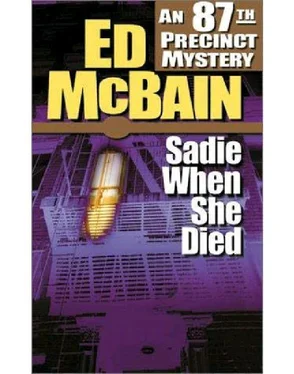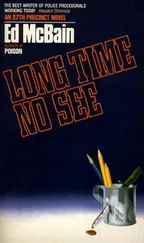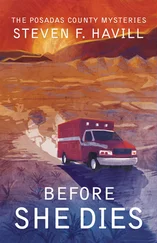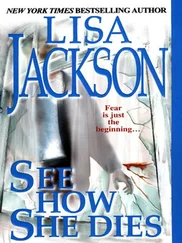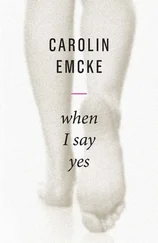Ed McBain - Sadie When She Died
Здесь есть возможность читать онлайн «Ed McBain - Sadie When She Died» весь текст электронной книги совершенно бесплатно (целиком полную версию без сокращений). В некоторых случаях можно слушать аудио, скачать через торрент в формате fb2 и присутствует краткое содержание. Жанр: Полицейский детектив, на английском языке. Описание произведения, (предисловие) а так же отзывы посетителей доступны на портале библиотеки ЛибКат.
- Название:Sadie When She Died
- Автор:
- Жанр:
- Год:неизвестен
- ISBN:нет данных
- Рейтинг книги:4 / 5. Голосов: 1
-
Избранное:Добавить в избранное
- Отзывы:
-
Ваша оценка:
- 80
- 1
- 2
- 3
- 4
- 5
Sadie When She Died: краткое содержание, описание и аннотация
Предлагаем к чтению аннотацию, описание, краткое содержание или предисловие (зависит от того, что написал сам автор книги «Sadie When She Died»). Если вы не нашли необходимую информацию о книге — напишите в комментариях, мы постараемся отыскать её.
Sadie When She Died — читать онлайн бесплатно полную книгу (весь текст) целиком
Ниже представлен текст книги, разбитый по страницам. Система сохранения места последней прочитанной страницы, позволяет с удобством читать онлайн бесплатно книгу «Sadie When She Died», без необходимости каждый раз заново искать на чём Вы остановились. Поставьте закладку, и сможете в любой момент перейти на страницу, на которой закончили чтение.
Интервал:
Закладка:
“So where the hell is it?” Meyer asked impatiently. One hand on the door of the police sedan, he looked up at the threatening sky and all but shook his fist at the gray clouds overhead.
“It’ll come,” Carella said.
“When?” Meyer asked flatly, and opened the door, and climbed into the car. Carella started the engine. “Damn forecasters never know what they’re doing,” Meyer said. “Last big storm we had, they were predicting sunny and mild. We can put men on the moon, but we can’t tell if it’s going to drizzle on Tuesday.”
“That’s an interesting thing,” Carella said.
“What is?”
“About the moon.”
“What about the moon?”
“Why should everything down here be expected to work perfectly just because we’ve put men on the moon?”
“What the hell are you talking about?” Meyer said.
“We can put men on the moon,” Carella said, “but we can’t get a phone call through to Riverhead. We can put men on the moon, but we can’t settle a transit strike. We can put men on the moon . . .”
“I get your point,” Meyer said, “but I fail to see the parallel. There is a connection between the weather and the billions of dollars we’ve spent shooting meteorological hardware into space.”
“I merely thought it was an interesting observation,” Carella said.
“It was very interesting,” Meyer said.
“What’s the matter with you this morning?”
“Nothing’s the matter with me this morning.”
“Okay,” Carella said, and shrugged.
They drove in silence. The city was a monochromatic gray, the backdrop for a Warner Brothers gangster film of the thirties. The color seemed to have been drained from everything—the most vivid billboards, the most vibrant building façades, the most lurid women’s clothing, even the Christmas ornaments that decorated the shop windows. Overhung with eternal grayness, the trappings of the yuletide season stood revealed as shabby crap, tinsel and plastic to be exhibited once a year before being returned to the basement. In this bleak light, even the costumes of the streetcorner Santa Clauses appeared to be a faded maroon rather than a cheerful red, the fake beards dirty, the brass bells tarnished. The city had been robbed of sunshine and denied the cleansing release of snow. It waited, and it fretted, and it grew crankier by the minute.
“I was wondering about Christmas,” Carella said.
“What about it?”
“I’ve got the duty. You feel like switching with me?”
“What for?” Meyer said.
“I thought I’d give you Chanukah or something.”
“How long do you know me?” Meyer asked.
“Too long,” Carella said, and smiled.
“How many years has it been?” Meyer said. “And you don’t know I celebrate both Chanukah and Christmas? I’ve had a Christmas tree in the house ever since the kids were born. Every year. You’ve been there every year. You were there last year with Teddy. You saw the tree. Right in the living room. Right in the middle of the goddamn living room.”
“I forgot,” Carella said.
“I celebrate both,” Meyer said.
“Okay,” Carella said.
“Okay. So the answer is no, I don’t want to switch the duty.”
“Okay.”
“Okay.”
In this mood of joyous camaraderie, Meyer and Carella parked the car and went into the building at 480 Reed Street, and up the elevator to the sixth floor—in silence. Hart and Widderman manufactured watchbands. A huge advertising display near the receptionist’s desk in the lobby proudly proclaimed H & W BEATS THE BAND ! and then backed the slogan with more discreet copy that explained how Hart and Widderman had solved the difficult engineering problems of the expansion watch bracelet to present to the world their amazing new line, all illustrated with photographs as big as Carella’s head, in gleaming golden tones he felt certain he could hock at the nearest pawnshop. The receptionist’s hair was almost as golden, but it did not look as genuine as that in the display. She glanced up from her magazine without much interest as the detectives approached her desk. Meyer was still reading the advertising copy, fascinated.
“Mr. Hart, please,” Carella said.
“Who’s calling?” the receptionist asked. She had a definite Calm’s Point accent, and she sounded as if she were chewing gum, even though she was not.
“Detectives Carella and Meyer.”
“Just a minute, please,” she said, and lifted her phone, and pushed a button in the base. “Mr. Hart,” she said, “there are some cops here to see you.” She listened for a moment, and then said, “Yes, sir.” She replaced the receiver on its cradle, gestured toward the inside corridor with a nod of her golden tresses, said, “Go right in, please. Door at the end of the hall,” and then went back to discovering what people were talking about in Vogue .
The gray skies had apparently got to Andrew Hart, too.
“You didn’t have to broadcast to the world that the police department is here,” he said immediately.
“We merely announced ourselves,” Carella said.
“Well, okay, now you’re here,” Hart said, “let’s get it over with.” He was a big man in his middle fifties, with iron-gray hair and black-rimmed eyeglasses. His eyes behind their lenses were brown and swift and cruel. His jacket was draped over the back of the chair behind his desk, and his shirt sleeves were rolled up over powerful forearms dense with black hair. A gold expansion bracelet, undoubtedly one of his own, held his watch fastened to his thick wrist. “If you want to know the truth,” he said, “I don’t know what the hell you’re doing here, anyway. I told you I don’t know any Sarah Fletcher, and I don’t.”
“Here’s her book, Mr. Hart,” Carella said, figuring there was no sense wasting time with a lot of bullshit. He handed the address book to Hart, opened to the MEMORANDA page. “That’s your name, isn’t it?”
“Yeah,” Hart said, and shook his head. “But how it got there is beyond me.”
“You don’t know anybody named Sarah Fletcher, huh?”
“No.”
“Is it possible she’s someone you met at a party, someone you exchanged numbers with . . .”
“No.”
“Are you married, Mr. Hart?”
“What’s that got to do with it?”
“ Are you?”
“No.”
“We’ve got a picture of Mrs. Fletcher, I wonder . . .”
“Don’t go showing me any pictures of a corpse,” Hart said.
“This was taken when she was alive. It’s a recent picture, it was on the dresser in her bedroom. Would you mind looking at it?”
“I don’t see any sense in this at all ,” Hart said. “I told you I don’t know her. How’s looking at her picture . . . ?”
“Meyer?” Carella said, and Meyer handed him a manila envelope. Carella opened the flap and removed from the envelope a framed picture of Sarah Fletcher, which he handed to Hart. Hart looked at the photograph, and then immediately looked up at Carella.
“What is this?” he said.
“Do you recognize that picture, Mr. Hart?”
“Let me see your badge,” Hart said.
“What?”
“Your badge, your badge. Let me see your identification.”
Carella took out his wallet, and opened it to where his detective’s shield was pinned opposite his I.D. card. Hart studied both, and then said, “I thought this might be a shakedown.”
“Why’d you think that?”
Hart did not answer. He looked at the photograph again, shook his head, and said, “Somebody killed her, huh?”
“Yes, somebody did,” Carella answered. “Did you know her?”
“I knew her.”
Читать дальшеИнтервал:
Закладка:
Похожие книги на «Sadie When She Died»
Представляем Вашему вниманию похожие книги на «Sadie When She Died» списком для выбора. Мы отобрали схожую по названию и смыслу литературу в надежде предоставить читателям больше вариантов отыскать новые, интересные, ещё непрочитанные произведения.
Обсуждение, отзывы о книге «Sadie When She Died» и просто собственные мнения читателей. Оставьте ваши комментарии, напишите, что Вы думаете о произведении, его смысле или главных героях. Укажите что конкретно понравилось, а что нет, и почему Вы так считаете.
